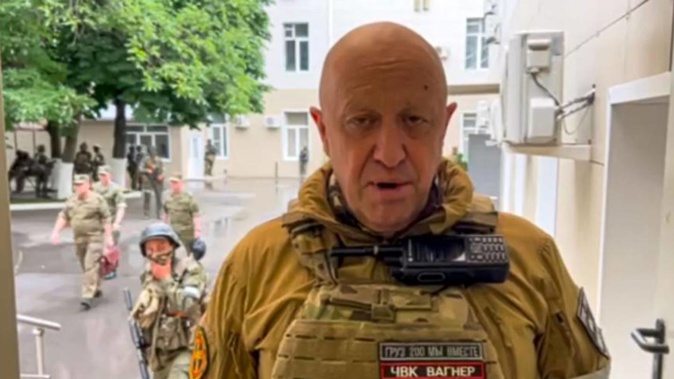
Mercenary leader Yevgeny Prigozhin, who led a brief armed rebellion against the Russian military earlier this year, was aboard a plane that crashed north of Moscow on Wednesday, killing all 10 people on board, according to Russia’s civil aviation agency.
The crash immediately raises suspicions since the fate of the founder of the Wagner private military company has been the subject of intense speculation ever since he mounted the mutiny. The Kremlin said he would be exiled to Belarus, but the mercenary chief, whose troops were some of the best fighting forces for Russia in Ukraine, has since reportedly popped up in Russia.
The crash also comes after Russian media reported that a top general linked to Prigozhin was dismissed from his position as commander of the air force.
A plane carrying three pilots and seven passengers that was en route from Moscow to St. Petersburg went down more than 100 kilometres north of the capital, according to officials cited by Russia’s state news agency Tass. It was not clear if Prigozhin was among those on board, though Russia’s civilian aviation regulator, Rosaviatsia, said he was on the manifest.
Wagner-linked Telegram channels have claimed that the plane was shot down by Russian air defences.
Russia’s state news agency Tass cited emergency officials as saying that the plane carried three pilots and seven passengers.
/cloudfront-ap-southeast-2.images.arcpublishing.com/nzme/BED4NODQOBC5XDDQ42TOXYJXZE.jpg)
Russian businessman Yevgeny Prigozhin's business jet crashed en route from Moscow to St Petersburg. Photo / Sergei Ilnitsky, Pool via AP, File
The authorities said they were investigating the crash, which occurred in the Tver region more than 100km north of Moscow.
Prigozhin led an abortive coup against Russia’s military leadership in June, which ended after Wagner fighters were promised amnesty in neighbouring Belarus.
Baza, a Russia Telegram channel with links to the security services, said: “According to one version, a terrorist attack was the cause of the explosion on board the plane.”
Others have suggested it was shot down by Russian air defences as it headed to St Petersburg.
Flight tracking data reviewed by the Associated Press shows a private jet registered to Wagner that Prigozhin had used previously took off from Moscow on Wednesday evening and its transponder signal disappeared minutes later.
The signal was lost in a rural region where there are no nearby airfields where the jet could have landed safely.
In recent days, Prigozhin had published his first recruitment video for the Wagner Group since organising a short-lived mutiny against defence officials in Russia, according to information on Russian social media channels.
Yevgeny Prigozhin speaks to a camera from an unknown location. Photo / Razgruzka_Vagnera telegram channel via AP
Prigozhin moved into the global spotlight in June with a dramatic, short-lived rebellion that posed the most serious threat to President Vladimir Putin of the Russian leader’s 23-year rule.
The Wagner founder long benefited from Putin’s powerful patronage, including while he built a private army that fought for Russian interests abroad and participated in some of the deadliest battles of the war in Ukraine.
In the video, which was posted on Telegram messaging app channels believed to be affiliated with Prigozhin, a person who appears to be the 62-year-old mercenary leader says the Wagner Group is conducting reconnaissance and search activities, and “making Russia even greater on all continents, and Africa even more free”.
“We are hiring real strongmen and continuing to fulfil the tasks which were set and which we promised to handle,” the speaker in the video says, toting an assault rifle and wearing military fatigues. Pickup trucks and other people dressed in fatigues were in the background.
The Kremlin has used the Wagner Group since 2014 as a tool to expand Russia’s presence in the Middle East and Africa.
Prigozhin spent months criticising Russia’s military performance in Ukraine before he called for an armed uprising on June 23 to oust the defence minister and headed from Ukraine toward Moscow with his mercenaries.
Under a deal brokered by Belarusian President Alexander Lukashenko, Prigozhin agreed to end his rebellion in exchange for amnesty for him and his fighters and permission to relocate to Belarus. Before moving to Belarus, Wagner handed over its weapons to the Russian military, part of efforts by Russian authorities to defuse the threat posed by the mercenaries.
Putin branded Prigozhin a traitor as the revolt unfolded and vowed harsh punishment, but the criminal case against the mercenary chief on rebellion charges was later dropped. Unusually, the Kremlin said Putin had a three-hour meeting with Prigozhin and Wagner Group commanders days after the rebellion.
Take your Radio, Podcasts and Music with you

/cloudfront-ap-southeast-2.images.arcpublishing.com/nzme/PL7HQV5QOBAYDMBSXCZHEQZK3M.JPG)








